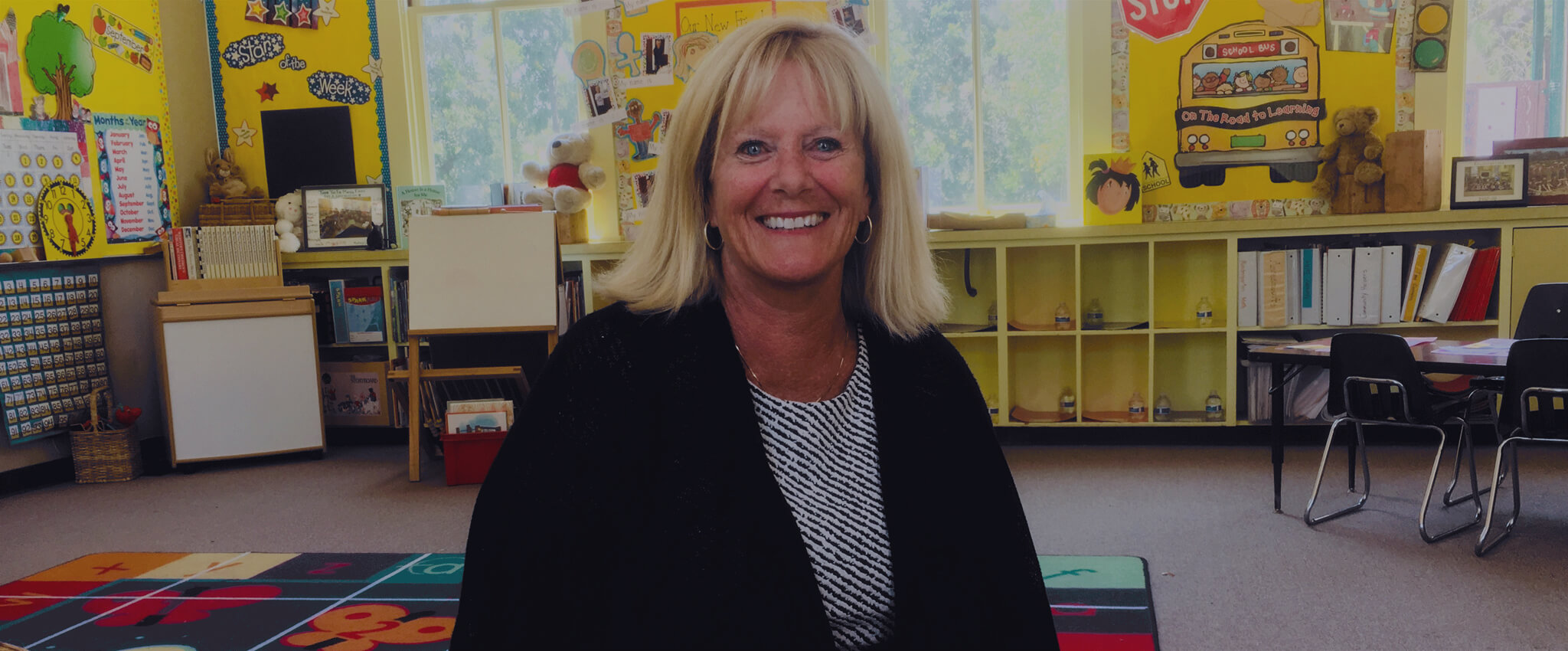As you stand before the red schoolhouse with the verdant lawn sprawling out before it, you can’t help but be drawn in by its idyllic setting. In daily use since 1883, it remains largely the same as it was over a century ago. Of course, back then, the red schoolhouse was home to all nine grades; kindergarten through eighth grade. Now it houses only the kindergarten class and its inimitable teacher, Mrs. Carlson.

With 38 years of teaching under her belt, including stints as a master teacher who mentored the newbies, it’s safe to say Mrs. Carlson has seen it all. And although much has changed over the years, her advice to parents for a successful school year has remained rather consistent.
In her words, “You really need to set your kids up for success. For example, when parents are late getting to school, it can be really difficult on kids. They miss critical instructions for the morning and are often embarrassed when they have to walk in to a quiet classroom with all attention on them.”
Mrs. Carlson’s Tips for a Successful School Year
1. Plan for the week on Sunday.
“When our three kids were in school, we had a big box. We’d put paper sacks in it for the week (even if they used lunch boxes). So we had 15 lunch sacks and we would add all of the non-perishable items to the lunch sacks on Sunday night. That way, all we had to do the night before or in the morning was make the sandwiches and add any other perishables like carrots.”
2. Agree on bed times and wake-up times.
Engage your kids in determining bed times and wake-up times. Use it as an opportunity to learn how to tell time…“When the big hand is on the twelve and the little hand is on the eight, it’s time for bed.” You’ll get less flack if the child is bought into the rules.
Make sure you allow time for your child to transition to sleep too. Nobody goes from 60 to 0 immediately. Fold reading a story into your child’s routine. More than one child? “There are some great stories on tape.”
3. Set a morning routine.
“Make a laminated chart with each day of the week. Then add sticky notes with tasks for each child for the morning such as Make Bed, Eat Breakfast, Go to Bathroom, Get Dressed. They are then in charge of working through their own morning to-do list. This encourages independence and self-management.”

4. Plan ahead for play dates.
“I see a lot of unnecessary stress on both parent and child when it comes to play dates. Our solution was to establish a rule that a play date must be planned at least one day in advance. That way you eliminate the disappointing situations when your child comes rushing up to you with her friend and you have to say no.”
JF: On that note, what if you don’t know the other child’s parents and as a result you’re not comfortable with your child going over to the friend’s house?
“That happens a lot when you’re starting at a new school or beginning a new school year. Suggest a mutual meeting spot like a park or museum. That way you can get to know the other parent as well. Also, I’m a fan of not more than two play dates or so a week. Kids need some down time to recharge.”
5. Backpacks for each activity.
“Our kids were super involved in sports and dance. To avoid the forgotten kneepads or toe shoes or baseball glove, we had a backpack for each activity. When uniforms were washed, they went straight into the backpack. You can prep these on Sunday night for the week as well.
It’s a good idea to keep a case of water bottles in the car too. Most kids have a reusable water bottle now, but the others are handy in case someone forgets. Dehydration isn’t good for anybody.”
6. Central basket for papers that come home.
How many times has your child hit you with that paper that has to be signed as you’re racing out the door? Or maybe that note from school that it’s your turn to bring snacks tomorrow?
“Put a basket or a box in a central location where all papers or notes from school get plopped each night. If you make it a routine, the kids will get used to it and you’ll reduce the number of morning surprises.”

Need to create signups for your PTA or PTO? Get started for free.
7. Establish a homework station.
“Whether it’s your kitchen table or a desk in your child’s room, establish a spot where your kids will do homework every day. What you want to avoid is any excuses. Keep it clear and ready to go with pencils, pens, erasers, and paper in reach. Also, make sure that what comes out of backpacks goes right back into backpacks when they’re finished. This means folders, library books, or anything else. This way their backpacks are ready to go in the morning and nothing gets forgotten.
And on that note, for young students, like my kindergartners, I expect them to spend 20 minutes every night on homework. If they finish early, they should read. If there’s something they’re not getting, then let the teacher know about it the next day. But in my experience, 20 minutes is just right for a kindergartner.”
8. Prepare breakfast (kind of) the night before.
“I work full-time and when our kids were young, mornings needed to go smoothly. We set the table the night before with bowls, spoons, and cereal boxes.”
9. Shoe tying and hair brushing pro tip.
“If you tie your kids’ shoes or brush their hair while they’re eating breakfast, it goes waaaaay faster.”
10. Make it easy for them to enjoy their day.
“Send your kids to school ready to learn. If they’re wearing uncomfortable “fancy” clothes, or big boots or sandals, it’s hard for them to enjoy being kids. Dress them in clothes that they can sit comfortably in and won’t make it hard for them to run around at recess.”
11. Make sure your child knows who is picking her up.
“Kids get anxious when they’re not sure who’s picking them up from school. Manage expectations and let them know in advance if Grandpa is picking them up or it’s Wednesday, so the babysitter is picking them up. Kids like predictability.”
12. Don’t fuel the fire.
“One of the things we work really hard to model in our school is empathy. So when I hear parents running down a child or a teacher in the parking lot, I’m really disappointed. Even though you may genuinely feel that way, kids are really impressionable. Instead, consider showing some empathy, and talk about putting yourself or your student in the other child’s or teacher’s shoes.”
“Emma must be really sad right now. She spent a lot of time with her Grandma and now she’s moved away.”
13. Don’t make excuses for your child.
“We spend our lives protecting our children. They are our most precious accomplishments. It’s really hard, but we need to sometimes step outside of our parent role and look at our child as a person. Be firm with what’s right and what’s wrong. Don’t make excuses for them. If you’re continually letting them off the hook for bad behavior, you’re not helping them – you’re setting up a bad precedent for their futures.”
How about you? Any tips for a successful school year that you’d like to share?
- – Originally published September 5, 2018
